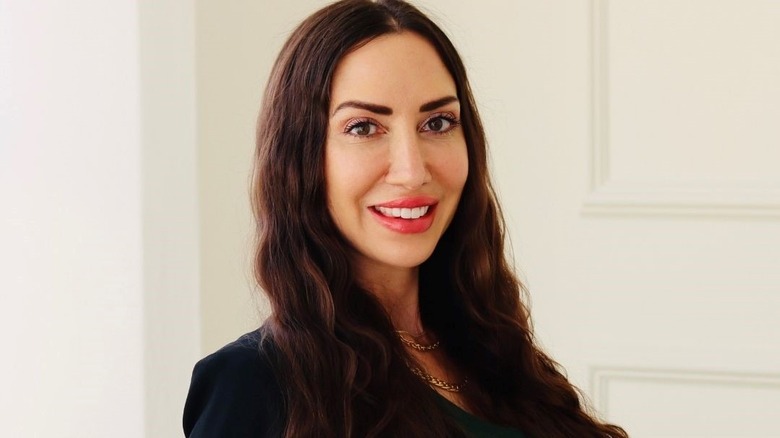Sexpert Dr. Kate Balestrieri On Sex Therapy, Positivity, And Keeping Sex Fun While Conceiving - Exclusive Interview
Before Dr. Kate Balestrieri became a sex therapist, she worked with sex offenders as a clinical and forensic psychologist. Though that may seem like a strange transition to some, it made perfect sense to her. After seeing how sex can be used to inflict harm, she wanted to help people have happy and healthy sex lives. She decided to study the psychology of sex and intimacy, and then founded Modern Intimacy, a sex therapy practice with offices in multiple states that connects qualified sex therapists with individuals and couples who want to improve their relationships to sex and intimacy.
Dr. Balestrieri's clients come to her for all sorts of reasons, ranging from sexual dysfunction to discovering safe and respectful ways to spice up their sex lives with some kink. She also helps couples work through issues they're having while trying to conceive, which can put a lot of pressure on both partners and add stress to a relationship.
In an exclusive interview with Health Digest, Dr. Balestrieri shared why removing shame from sex is so important, how to keep sex fun when trying to conceive, and how to bring intimacy back into a relationship when sex feels like a chore.
What is a sex therapist?
Can you tell us a bit about your background? Why did you decide to specialize in the psychology of sex and intimacy?
I am a clinical and forensic psychologist (CA, FL, IL, NY) and certified sex therapist. I decided to specialize in the psychology of sex and intimacy because I recognized that sex negativity led to shame about sex, and often has a negative impact on peoples' relationships with themselves, family members, romantic and sexual partners.
Having worked with sex offenders for many years, I also became astutely aware of the way sex was weaponized, in service of other ego and relational needs, interpersonally and collectively, in society. For me, the intersection of sex and mental health offered infinite dimensions of study and curiosity because each of us has our own relationship with sex, and we are diverse creatures.
What exactly does a sex therapist do and why do couples seek a sex therapist?
A sex therapist is a licensed mental health professional who has embarked on a specialize path of additional education, supervision and training to understand, more intricately, the interplay between human sexuality and mental health.
Couples can work with a sex therapist for a myriad of reasons. Some of the more common reasons include: mismatched desire/low desire, navigating different sexual interests, cultivating sex after trauma, trying new sexual experiences (kink/BDSM), opening a relationship (negotiating relationship boundaries), addressing sexual dysfunction (early ejaculation, erectile dysfunction, pain during sex, lack of orgasm), adding vitality to their sex life, sex before, during and after pregnancy, [and] infidelity.
How trying to conceive can change sex
How does trying to conceive put stress on relationships?
Trying to conceive can elicit many new feelings and contexts for sex that can carry couples away from pleasure and play to goal driven motives and obligation. This can remove some of the fun, and having sex may seem more like a chore. If pregnancy does not happen within the couple's frame of expectation, one or both partners can begin to resent sex or their partner or feel insecure about initiating it.
Couples may stop feeling special in sexual moments and can attribute fear or hesitance, leading them to ambivalence. They want to be sexual to try and conceive, but may be compelled to avoid [sex and] avoid the disappointment that may follow if pregnancy does not occur.
How can that stress impact couples' sex lives?
Couples may begin to fight more or feel frustrated with themselves or each other. They may feel less attracted to each other or experience lower desire than is typical. They may feel rejected or unimportant to each other because the goal shifts from pleasure to pregnancy.
What can couples do to focus on their relationship while trying to conceive?
Create time [and] space for non-pregnancy related intimacy. That can include penetrative sex, or not, but it is important to have some play without an agenda, so you stay connected. Even during opportune times to conceive, try to create intentional moments of pleasure that remind you that you are there with each other, not just to create a human. Take each other on dates or make time for each of you to have more time for self-care and other social events.
Couples who maintain texture in their lives are likely to have a better chance of staying connected and balanced in their relationship, in general, and when they are trying to conceive. Couples who forget who they are and make everything about getting pregnant have a higher likelihood of getting frustrated with themselves and each other.
Keeping sex fun while trying to conceive
For many couples, trying to conceive becomes like following a schedule – tracking ovulation, scheduling sex at the "right time" to conceive, tracking when to take pregnancy tests, etc. How can couples break out of this "scheduled" mindset and keep their sex lives spontaneous and exciting?
One strategy is to plan time to be spontaneous. It sounds like an oxymoron, but you can plan time to be available for sex, without a commitment to it, then if the mood strikes, you can indulge. If not, there is no pressure. Work hard to help each other get support throughout the week. It is difficult to switch gears from work/conceive mode into being erotic mode. Get curious about how you each may need to transition from human doing to human being, so you have the space mentally to cultivate spontaneous eroticism.
Does trying new things in the bedroom help take the pressure out of trying to conceive or is it better to stick to what couples are comfortable with while trying to conceive?
It really depends on the couple. For some, a little novelty can go a long way. For others, introducing something new may feel like more work and make sex less interesting because it mirrors the emotional labor of focusing on the details of trying to conceive.
Supporting each other while trying to conceive
How can someone best support their partner who is trying to become pregnant?
Take it upon yourself to educate yourself on as much as you can related to pregnancy. The pregnant partner is doing a lot, and supportive partners do what they can to help shoulder the burden of carrying. Listen to your partner's needs, experiences and limits, and validate them, even if you don't agree or understand.
If you are not carrying the child, do carry your partner — not literally (although maybe), but in spirit. Be the person they can lean on and feel safe being vulnerable with. Being pregnant is incredibly vulnerable and literally takes from them every minute of every day. Be a part of what replenishes your partner and watch your relationship strengthen for a stronger foundation for your child and as partners and co-parents.
How can each partner support their partner's mental health while trying to conceive?
[Some] of the most important skills you can learn to support your partner's mental health while you're trying to conceive are the arts of attunement, empathy and validation. With every pregnancy, things can be different. You may both be surprised on a regular basis about how you feel, how something is impacting you and how you're communicating.
Expect to be triggered, and practice how to self-regulate and co-regulate. Doing these things allows you to cultivate and reinforce safety, which allows you both to feel more connected and supported and allows your partner to have a more regulated mind and body, which is better for conception and pregnancy.
How can sex therapy help couples trying to conceive?
Sex therapy while trying to conceive can give you both a space to process your feelings while learning how to support each other more effectively. You can brainstorm new ways to be sexual or ways to address sexual boredom, frustration, discomfort or dysfunction.
Most importantly, sex therapy while you're trying to conceive can increase the implicit safety and connection you feel together, which can help serve as a buffer for more stressful moments and make for an easier time while you're trying to conceive, [as well as] during and after pregnancy.
Dr. Kate Balestrieri and her team are dedicated to helping people have a more expansive and integrated relationship with sex in an ever-changing contemporary landscape. Learn how Dr. Balestrieri is changing the conversation around mental health, relational, and sexual health and wellness by visiting her website – Modern Intimacy.
This interview has been edited for clarity and formatting.





